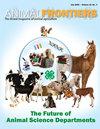Mis)information and the politicization of food security
IF 3.2
2区 农林科学
Q1 AGRICULTURE, DAIRY & ANIMAL SCIENCE
引用次数: 1
Abstract
Agricultural biotechnology, particularly the introduction of genetically modified (GM) crops continues to be controversial more than two decades after they were introduced. For a technology that is now so widely adopted around the world, why is this so? Among the many explanations that have been offered, one focuses on the way that differing perspectives on new technology introductions become entrenched, whether or not they are warranted by the available evidence. Genetically modified crops have experienced a long tradition of entrenched and polarized views, commencing with an insalubrious exchange between Richard Dawkins and Prince Charles on the occasion of the latter’s 2000 Reith Lecture (Ruse and Castle, 2002). More recently in late 2016, the New York Times claimed it had conducted an “extensive examination” of GM crops and found their benefits to be lacking, a claim that was vociferously challenged by scientists and famers alike, some of whom wrote a pointed rebuttal (Hakim, 2016; Giddings, 2016). The rebuttal gives references to several reviews and analyses of the benefits—and it should be added, the limitations—of GM crops, particularly in the United States and Canada, and other GM crop adopting nations. No one has claimed that GM crop technologies are the “silver bullet” to effective yield gain and pesticide reduction (Scott, 2016), but the record of evidence suggests there have been substantial benefits for consumers, farmers, human health, the environment, and sustainable development. Despite research dating back 15 yr reporting the benefits of GM crops, and acknowledgment of their limitations, critics of GM crops (and biotechnology more generally) continue to dismiss this information and ignore the multitude of benefits resulting from their adoption. Critics go as far as insinuating that the biotechnology industry has co-opted academic researchers and is paying academics to mislead the public in the quantification of the benefits of biotech crops, as is evidenced by the US Right to Know campaign’s request for freedom-of-information access to the emails of more than 40 leading American academics (Kloor, 2015). These opponents suggest that the distribution of benefits is not equal (benefit distribution is not equal for any technology), causes farmers to commit suicide, and is polluting the land (Adams, 2014). Much of this misleading information was captured in the 2013 report released by the United Nations Conference on Trade and Development (UNCTAD) entitled, “Trade and Environmental Review 2013: Wake Up Before It Is Too Late” (United Nations Conference on Trade and Development, 2013). While containing contributions from more than 60 experts, no single expert in biotechnology or GM crops was listed in the table of contents. On the contrary, many of the contributors listed have been longstanding critics of biotechnology and GM crops. The essential message of this lengthy report was that for food security to exist over the remainder of this century, agriculture in developing countries needs to return to largely organic, small-scale farming practices. Despite evidence to the contrary, deeply entrenched positions persist much as they have for the last two decades. In response, this article begins with a concise summary of the documented benefits from GM crops from around the world, before turning to a discussion of how environmental non-governmental organizations (eNGOs) have developed a stance on GM crops that presents them with a dilemma: accept some of the evidence and lose political ground or hold the ground and deny all evidence. As that dilemma continues for eNGOs and there is no resolution in sight, we turn in the third section to discuss some of the avenues for continuing and improving communication about the benefits and risks of adopting GM crop technologies. Our conclusion is that the selective use of information or denial of the existence of evidence about the benefits of GM crops politicizes food security in ways that make many millions of hungry people vulnerable.错误的信息和粮食安全的政治化
农业生物技术,特别是转基因作物的引进在引进20多年后仍然存在争议。对于一项现在在世界范围内被广泛采用的技术,为什么会这样呢?在提供的许多解释中,有一种解释侧重于对新技术引入的不同观点是如何根深蒂固的,无论这些观点是否得到现有证据的支持。转基因作物经历了根深蒂固和两极分化的长期传统,始于理查德·道金斯(Richard Dawkins)和查尔斯王子(Prince Charles)在2000年Reith Lecture上的一次不健康的交流(Ruse and Castle, 2002)。最近在2016年底,《纽约时报》声称它对转基因作物进行了“广泛检查”,发现它们缺乏益处,这一说法受到了科学家和农民的强烈质疑,其中一些人写了一篇尖锐的反驳文章(Hakim, 2016;吉丁斯,2016)。反驳中提到了几篇关于转基因作物的益处和局限性的评论和分析,特别是在美国和加拿大以及其他转基因作物采用国。没有人声称转基因作物技术是有效提高产量和减少农药的“银弹”(Scott, 2016),但证据记录表明,对消费者、农民、人类健康、环境和可持续发展都有实质性的好处。尽管15年前的研究报告了转基因作物的好处,并承认了它们的局限性,但转基因作物(以及更普遍的生物技术)的批评者继续忽视这些信息,忽视采用转基因作物带来的众多好处。批评者甚至暗示,生物技术行业已经拉拢了学术研究人员,并付钱给学者,让他们在量化生物技术作物的好处方面误导公众,正如美国知情权运动要求获得40多名美国知名学者的电子邮件的信息自由所证明的那样(Kloor, 2015)。这些反对者认为,利益分配不平等(任何技术的利益分配都不平等),导致农民自杀,并污染土地(Adams, 2014)。联合国贸易和发展会议(UNCTAD)在2013年发布的题为《2013年贸易与环境审查:在为时已晚之前醒来》(联合国贸易和发展会议,2013年)的报告中捕捉到了这些误导性信息。虽然包含了60多位专家的贡献,但目录中没有列出任何一位生物技术或转基因作物方面的专家。相反,所列的许多贡献者长期以来一直是生物技术和转基因作物的批评者。这份冗长报告的基本信息是,为了在本世纪余下的时间里维持粮食安全,发展中国家的农业需要回归有机的小规模农业实践。尽管有相反的证据,但根深蒂固的立场与过去二十年一样依然存在。作为回应,本文首先简要总结了世界各地有文献证明的转基因作物的好处,然后转向讨论环保非政府组织(eNGOs)如何在转基因作物问题上形成一种立场,使他们陷入两难境地:接受部分证据,失去政治立场,还是坚持立场,否认所有证据。由于engo的困境仍在继续,而且目前还没有解决办法,我们将在第三部分讨论继续和改善关于采用转基因作物技术的利益和风险的沟通的一些途径。我们的结论是,有选择性地使用信息或否认存在关于转基因作物益处的证据,使粮食安全政治化,使数百万饥饿人口变得脆弱。
本文章由计算机程序翻译,如有差异,请以英文原文为准。
求助全文
约1分钟内获得全文
求助全文
来源期刊

Animal Frontiers
Veterinary-Food Animals
CiteScore
6.50
自引率
5.60%
发文量
74
期刊介绍:
Animal Frontiers is the official journal of the following globally active professional animal science societies:
ASAS, the American Society of Animal Science
CSAS, the Canadian Society of Animal Science
EAAP, the European Federation of Animal Science
AMSA, the American Meat Science Association
These organizations are dedicated to the advancement and dissemination of science-based knowledge concerning animal agriculture. Animal Frontiers provides a novel forum for innovative and timely perspectives that have relevance to understanding the complex dynamics at work through animal agriculture. Animal Frontiers publishes discussion and position papers that present several international perspectives on the status of high-impact, global issues in animal agriculture. Every issue will explore a theme of broad and current interest within animal science and animal agriculture.
 求助内容:
求助内容: 应助结果提醒方式:
应助结果提醒方式:


